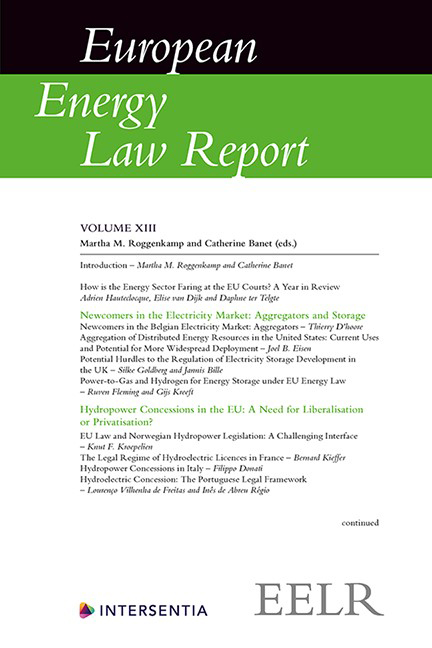Book contents
- Frontmatter
- Preface
- Contents
- List of Abbreviations
- List of Contributors
- Introduction
- Chapter I How is the Energy Sector Faring at the EU Courts? A Year in Review
- PART I NEWCOMERS IN THE ELECTRICITY MARKET: AGGREGATORS AND STORAGE
- PART II HYDROPOWER CONCESSIONS IN THE EU: A NEED FOR LIBERALISATION OR PRIVATISATION?
- PART III INVESTMENTS AND DISINVESTMENTS IN THE ENERGY SECTOR
- PART IV OFFSHORE DECOMMISSIONING IN THE NORTH SEA
- PART V CCS AS A CLIMATE TOOL: NORTH SEA PRACTICE
- PART VI FROM EU CLIMATE GOALS TO NATIONAL CLIMATE LAWS
Chapter I - How is the Energy Sector Faring at the EU Courts? A Year in Review
Published online by Cambridge University Press: 30 April 2020
- Frontmatter
- Preface
- Contents
- List of Abbreviations
- List of Contributors
- Introduction
- Chapter I How is the Energy Sector Faring at the EU Courts? A Year in Review
- PART I NEWCOMERS IN THE ELECTRICITY MARKET: AGGREGATORS AND STORAGE
- PART II HYDROPOWER CONCESSIONS IN THE EU: A NEED FOR LIBERALISATION OR PRIVATISATION?
- PART III INVESTMENTS AND DISINVESTMENTS IN THE ENERGY SECTOR
- PART IV OFFSHORE DECOMMISSIONING IN THE NORTH SEA
- PART V CCS AS A CLIMATE TOOL: NORTH SEA PRACTICE
- PART VI FROM EU CLIMATE GOALS TO NATIONAL CLIMATE LAWS
Summary
INTRODUCTION
The year 2018 was relatively quiet at the European Union (EU) courts on the energy and climate front, at least from a quantitative perspective. There have nonetheless been important cases in substance. Notwithstanding the Brexit context, the two most important cases undoubtedly came from the United Kingdom (UK). First, in the judgment of 12 July 2018, Austria v Commission (T-356/15, EU:T:2018:439, hereafter the ‘Hinkley Point C case’), the General Court confirmed the decision of the European Commission (the Commission) to declare aid to the ‘giant’ nuclear project compatible with the internal market on the basis of Article 107(3)(c) of the Treaty on the Functioning of the European Union (TFEU). Second, in the judgment of 15 November 2018, Tempus Energy and Tempus Energy Technology v Commission (T-793/14, EU:T:2018:790, hereafter the ‘Tempus case’), the General Court annulled the decision of the Commission not to raise objections and to declare the UK capacity mechanism compatible with the internal market. Both cases, which are under appeal (case C-594/18 P for the Hinkley Point C case and case C-57/19 P for the Tempus case), deserve an in-depth discussion as they may pave the way for further nuclear project and capacity mechanism cases. We will also observe the developments of some ongoing sagas, the main decisions for which are yet to come. For example, there has been a series of cases concerning the Agency for the Cooperation of Energy Regulators (ACER) decision on the capacity calculation regions in Austria/ Germany, as well as numerous battles surrounding the OPAL pipeline which connects Nord Stream I in North Germany to the gas network in the Czech Republic.
- Type
- Chapter
- Information
- European Energy Law Report XIII , pp. 13 - 32Publisher: IntersentiaPrint publication year: 2020

